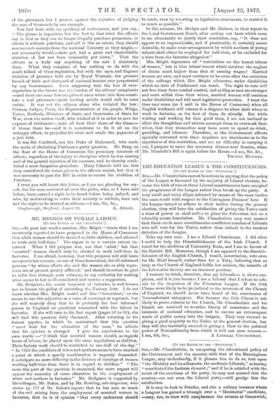MR. HUGHES ON FEMALE LABOUR.
[TO THE EDITOR OF THE"SPECTATOR."] Siu,—In your last week's number, Mrs. Bright " trusts that I am incorrectly reported to have proposed in the House of Commons that adult women should be treated as little children, and allowed to work only half-time." The report is to a certain extent in- correct. What I did propose was, not that adult,' but that
married' women should only be allowed to work half-time in factories. I am afraid, however, that this proposal will still leave me open to her censure, as one of those benevolent, but ill-informed persons "by whose efforts she and the women she so ably repre- sents are at present greatly afflicted," and should therefore be glad to refer her, through your columns, to my authority for making what seems to her so ill-considered and unwise a suggestion.
Mr. Redgrave, the senior inspector of factories, is well known not to favour the policy of extending the Factory Acts. I do not know whether Mrs. Bright would call him " benevolent," as she seems to use this adjective as a term of contempt or reproach, but she will scarcely deny that he is probably the best informed person in England on questions connected with the labour in factories. If she will turn to his last report (pages 54 to 59), she will find this question fully discussed. After referring to his former reports, in which he maintained that this question " must wait for the education of the men," he admits
that his opinion, is changed. I give his conclusions in his own words :—" I think that married women should, as regards hours of labour, be placed upon the same regulations as children. Their factory work should be restricted to one-half of the day." " In 1873 the condition of wives and mothers seems to have reached a point at which a speedy amelioration is urgently demanded. I anticipate no more difficulty in the division of earnings of women working half-time than there is in regard to children." "The more this part of the question is examined, the more urgent will appear the necessity of some alteration in the employment of wives and mothers in factories." Mr. Redgrave is supported by his colleague, Mr. Baker, and by Mr. Bowling, sub-inspector, who states (p. 117 of Mr. Baker's report) that he has seen so much of the evil arising from the employment of married women in factories, that he is of opinion " that every endeavour should
be made, even by resorting to legislative enactments, to restrict it as much as possible."
In like manner, Dr. Bridges and Mr. Holmes, in their report to the Local Government Board, after setting out facts which seem to me abundantly to justify their conclusion, say, " It does not appear to us impracticable, and if practicable, it certainly seems desirable, to make some arrangements by which mothers of young infants shall either be employed for half-time, or be excluded for a time from the factories altogether."
Mrs. Bright deprecates all "restrictions on the honest labour of women," but is that labour honest which involves the neglect of duties much higher than that of earning wages? Married women are now, and must continue to be even after the extension of the suffrage which Mrs. Bright advocates, under disabilities which no Acts of Parliament can reach. The right to vote will not free them from marital control, and as lo'bg as men are stronger and more selfish than their wives, married women will continue under disabilities and will need legislative protection. I trust the time may come (as I said in the House of Commons) when all English workmen will esteem it a disgrace to allow their wives to work in factories, as the best of them do already. But while waiting and working for that good time, I am not inclined to allow the thoughtless and vicious amongst them to overwork their wives, that they themselves may have more to spend on drink, gambling, and idleness. Therefore, as the Government officers specially entrusted with these inquiries are unanimous as to the expedience of this restriction, and see no difficulty in carrying it out, I propose to move the necessary clauses next Session, when Mr. Mundella's Bill is again before the House.-1 am, Sir, &c.,
THOMAS HUGHES.






























 Previous page
Previous page